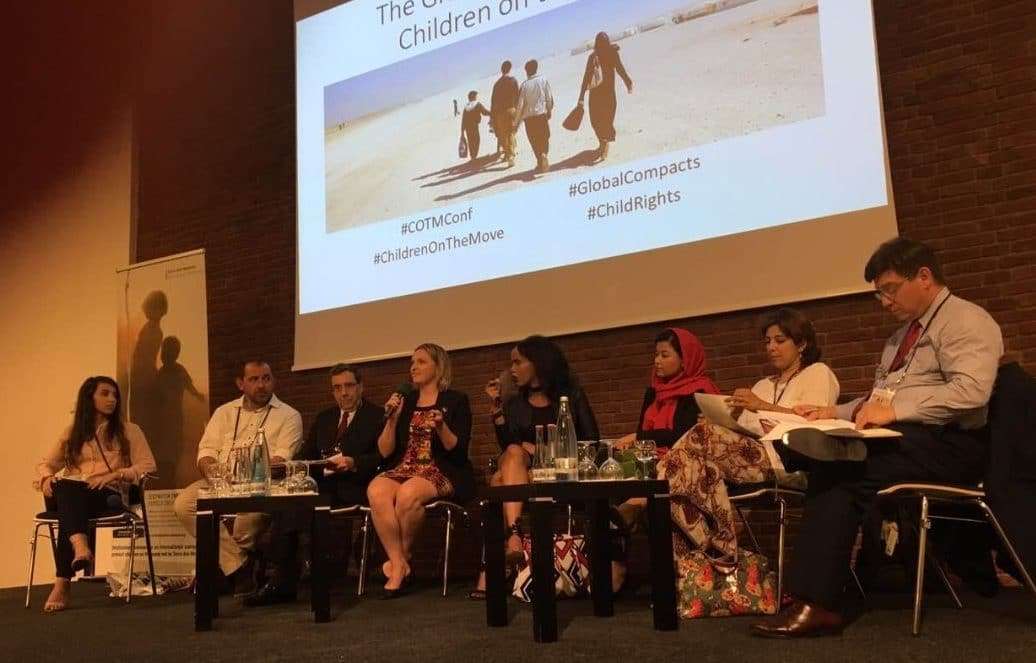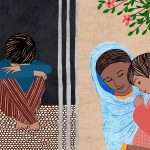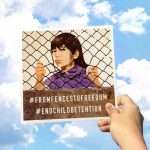#5YEAR Reflections & New Directions
My name is Leeanne, and I’ve served as the Campaign Coordinator for the Global Campaign to End Child Immigration Detention for the past four years. From our headquarters in Melbourne, I’ve been privileged to witness the growth of this campaign around the world. From launch events with our partners in Tanzania, Malaysia and Mexico in 2012, to the campaign’s youth expert panel before the Human Rights Council in 2013, to Australia’s #FreeTheChildren and #Detention4Detention solidarity actions in 2014, to creating art for social change exhibits with CultureStrike at the United Nations in 2015. The events, reports, hearings, and other public gatherings coordinated by us and our incredible partners are the pieces of work that have kept this issue on the table of decision makers. For that, we are honoured to work side by side with our partners and supporters on these initiatives and many others over the years.
In between the events is the quiet bustle of social justice campaigning that all human rights defenders take part in. For instance, the hours in front of laptops, international Skype meetings, Photoshopping media content, assessing electoral results in spreadsheets, or wordsmithing advocacy reports. Or we are out visiting families in detention or recently released from detention. Or attending meetings with targeted politicians alongside youth advocates and other experts.
This year, 2017, marks five years since the International Detention Coalition launched the Global Campaign to End Child Immigration Detention. In that moment, at the United Nations in Geneva, we set in motion a global collaborative effort grounded in a simple vision: a world that cherishes the humanity and dignity of children. To us, that means five points which have made up our campaign position from the beginning:
- We believe children should be free
- We believe children should be treated as children
- We believe children should be looked after
- We believe children should be in the community
- We believe children should be with their parents and families
From these points, we have been able to collaborate with supporters and partners around the globe who also believe as we do, and build a network together that spans the Americas, Australia, Europe, the Middle East, Africa, and Asia. Together we’re able to draw on our vast array of skills, perspectives, and strategies, and move forward in a direction that holds dear the humanity and dignity of children.
While we have made strides as a global campaign over the past five years, the majority of world leadership does not share this vision. We are seeing all time highs in numbers of people, families, and communities being forced to leave their homes due to war, famine, and persecution. The response from much of our world leadership has been to put up barriers, in the name of “protection,” to the very families around the globe in need of safety and refuge. These barriers have created mounting conditions of homelessness and statelessness among millions. These conditions have led to the rising immigration detention of entire families, including parents, grandparents, aunts, uncles, sisters, brothers, and children. With this humanitarian crisis taking place around the globe, we’ve seen several elections won based on politics of xenophobia and racism, driving fear of foreigners and anger towards migrants and refugees. This politics of hate is rising during a time when compassion, love and understanding is most needed. Our challenge today is to shift this debate from fear to understanding…from fences to freedom.
The most impactful work we do is bringing the voices of those who have been in detention into direct dialogue with decision makers. In 2012, we brought 5 young advocates together to present their experiences of detention to the United Nations. They chose to do this through a theatre piece called Hear Our Voices. They courageously stood before global policy makers and academic experts, and shared their own lived experiences of being locked up – one of the advocates, Armin, had spent six years of his childhood behind bars:
“It was a small world, the air was dark, my world was dark, I felt scared, I felt I was nobody, I was broken. In the detention centre everybody thinks they are nobody.”
Hear Our Voices from End Child Detention on Vimeo.
Following this performance, the Committee for the Child Rights Convention clearly declared that immigration detention is a violation of a child’s rights. This declaration and clarity of language really began a shift in international law. Today we’ve seen broad acknowledgement of this issue across a wide array of international legal entities and policy institutions. But the impact of advocacy done by those with lived experience goes beyond policy change. To this day, high level officials still remark on how moving this performance was. These young advocates changed hearts and minds by sharing their truth with the world. The campaign provides a sophisticated space to design events such as these for maximum influence and impact.
Events like this, with a coordinated advocacy strategy to amplify impact, have been at the core of our campaign work worldwide. We’ve taken the lead on international events, and we’ve worked with regional partners and national coalitions to provide input into their strategy development and achieve a coordinated message. Every country faces really different challenges, and the solutions we suggest need to be tailored, and the strategy to build political will needs to be tailored too.
That said, there is a lot of common ground, and sharing insight with others working on the same issue worldwide is valuable and often leads to new approaches, and importantly, new energy. Some of my favourite moments in the campaign have been hearing that organisations have continued to work together beyond their work on child detention and that the campaign created a space to build trust between partners on this work. It takes energy to work in collaboration, but I really think it is worthwhile.
One of the real turning points for the campaign took place in September 2016. In the lead up to New York Declaration, all the campaign supporters had been working together for years to harmonise their language on detention by this stage, including global players who have significant State partnerships like UNHCR, OHCHR, and UNICEF. Then, through the New York Declaration, all States did commit to working towards ending child detention.
Up until this stage, our work had focused on positive practice, highlighting progress, and getting our international partners aligned as much as possible to end child detention. What we see now, is a turning point. We’ve got a clear political platform that is recognised by the international policy-making community. Our job now is to chart that path forward for nations to build political will, and make change a reality. To meet with decision makers and share with them the insight that we have on alternatives to detention, what makes them a success, and how together we can shape policy that is more effective, affordable and humane.
But it is also time to point out who is preventing this progress: calling them out and putting the pressure on to make change happen. Advocates are often experts in a certain field, and they will suggest improvements to policies that provide a technical solution. What we forget is that a technical solution alone is not enough. We need to build political will, which often means that we need to craft a political dimension to our issue, so that there is a reason for our governments to take action.
Right now we are developing a scorecard, which ranks States progress towards ending child detention. It will also make it clear how States can improve their score – what the key considerations are when it comes to making progress on the issue of ending child detention. If you would like to input into the score we give your country, let us know. This will be a key tool in as we launch into the next five year strategy for the campaign.
Even short periods of detention gravely harm children’s wellbeing. Hundreds of thousands of children are locked up right now without cause. Locking children up as a policy has been wildly unsuccessful. It harmful, expensive and unnecessary. We have commitment, now we just need to mobilise to give our governments a reason to take action. We’re inviting you to become a part of this journey. This is your chance to get involved in meaningful work that will really make a difference for children, join us!
This blog post is part of the Five Year Anniversary Series commemorating the Global Campaign to End Child Immigration Detention. For more information and to get involved, please visit endchilddetention.org



